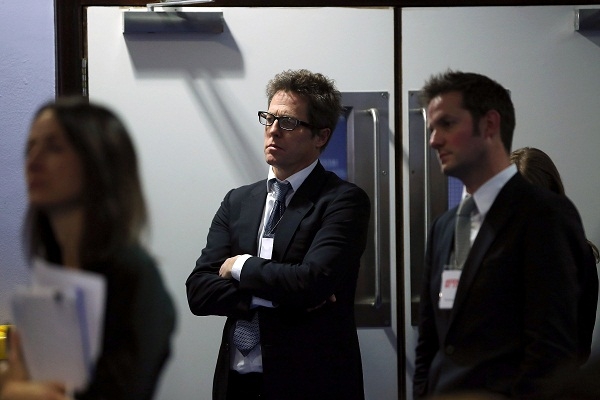I have worried about Hugh Grant’s understanding of power ever since he started bringing up baby. I first saw him reach for the innocent child at one of the party conferences, where he was on stage arguing for statutory control of the press. He had his stock reply ready when someone asked whether he wasn’t being naïve about the likelihood of politicians or politicised bureaucrats seizing the opportunity to censor.
‘The phrase that is always used is ‘don’t throw the baby out with the bath water’. I have always said I don’t think it is that difficult to tell what is bath water and what is a baby. To most people it is pretty obvious.’
‘Is it really, comrade?’ I thought to myself. It seems to me that it depends where the red lines are drawn and who is doing the drawing. It depends on knowing how a story will work out and what its consequences will be, which no one can know in advance. As I listened to his blithe assurance that the punishment of free speech was an easy task that reasonable men and women could perform without qualms, Saul Bellow’s wonderful sentence from the Adventures of Augie March ran through my mind.
‘Everybody knows there is no fineness or accuracy of suppression; if you hold down one thing you hold down the adjoining.’
Everybody knows it, that is, except Grant, the Hacked Off campaign, 99 per cent of the media studies academics in England and the Labour and Liberal Democrat parties This morning’s Telegraph raises a further objection. What about the people who want to throw out babies? What about the people who want to drown them in the bathwater and hurl them out of the window to stop them screaming the house down?
The Telegraph had discovered that Maria Miller had taken more than £90,000 from the taxpayer to spend on a house in Wimbledon, where her parents lived with her family. Its diligent reporters approached the Culture Secretary’s office for a response. Miller’s special adviser – one Joanna Hindley – pointed out that the Editor of The Telegraph was involved in meetings with the Prime Minister and the Culture Secretary over implementing the recommendations made by Lord Justice Leveson. Her reasons soon became clear.
‘“Maria has obviously been having quite a lot of editors’ meetings around Leveson at the moment,” she said. “So I am just going to kind of flag up that connection for you to think about.” The reporter should discuss the issue with “people a little higher up your organisation.”’
Hindley then contacted The Telegraph’s head of public affairs to raise concerns about the story. To its credit, the Telegraph published, even though the Conservatives are the party keenest on protecting freedom of speech, and political rather than journalistic considerations might have argued in favour of keeping Miller sweet.
Despite the Telegraph’s principled stand, don’t kid yourself that every editor will be as principled in future, and that this is not a foretaste of what may come. Everyone who has a secret wants to stop its exposure. I would, and you would. Everyone thinks the motives of their critics are suspect. (Miller’s “people,” for no reason I can see, suggested that the Telegraph are out to get her because she supported gay marriage).
The best way for free men and women to settle these disputes is to debate them in the open. Everyone ought to know that if the state gives manipulators the chance, they will attempt to rig the debate in private.
I am sorry to keep repeating myself, but there is no alternative way to stop press misbehaviour than enforcing the law of the land – a law, which may, incidentally, soon see as many journalists jailed in Britain as Iran or China (in case anyone thinks hacks are getting off lightly). By all means have a voluntary scheme to resolves grievances, but as soon as you make it statutory, special interests will start exercising covert pressure, and that thudding noise you will hear will be the sound of babies hitting the pavement.







Comments